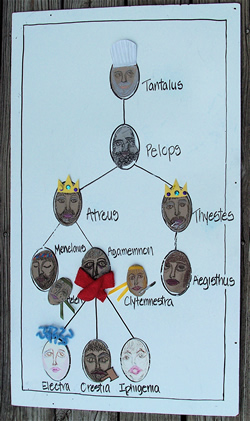A Modern Iliad
by Wendy and John Seefried
This modern epic based on the Iliad tells the gripping story of three families on a camping trip and their quest for cherry pies.
The journey was begun and scarce a person knew the ills and travails that were yet to befall the families that were enroute for their fifth consecutive rite of summer, the pilgrimage to Assateague where they were to hand-turn cherry pies over an open fire. Three generations of Kinards, pulling together as one man, had already established their camp.
In summer the great bird, the blue footed booby, makes its nest on the rocky shore after the long rains of April. It shakes off the mist of the crashing ocean waves from its great curved wings and raises its long beak to the bright sunshine feeling the warmth and power of the sun. And then it lowers its great beak and solemnly assembles the twigs that will be the home and shelter against the summer winds along the northern coast.
So too the ox-eyed Angie seeks with tall majestic David, trainer of basketball players, to create a shelter from the Assateague winds. Their stoic fisherman Tait, had indeed accompanied them so they had no concern for taking great quantities of fish from the sea. But, Nick, their fleet footed basketball player, remains along the fading shadows of the farmstead, studying for exams and caring for the chickens. Brooding in the long dark shadows on the Parkton hills that this summer, the first in five, he would not enjoy the succulent, sweet as nectar, hand-turned cherry pies.
A glance down the Assateague campground road reveals young Benjamin scootering along, giving evidence to the fact that the Kinard men’s dinner fire burns low and the hour of last activities has begun as the once blazing sun now settles on the western horizon and blue skies give way to the purple and orange hues of sunset. What is that in his hand? See he brandishes a weapon, no, a tool and weapon both, made from steel that cannot rust. A tool and weapon in one; fashioned on Swiss Mountain peaks. This tool and weapon in one with its folding movements was long carried from thousands of miles away by Barnie, Father of Ken. There also on the path along the sand-swept dune was Ken, the great strategist; Ken the sage in council; Ken the god-like man of many devices. The goodly Ken, son of Barnie, had longed to see this day when his kind father might for the very first time camp with Benjamin and bestow on him this stainless gift carried from a distant shore.
The next day after the fires that prepared the breakfast meal had been extinguished… the full compliment of Seefrieds and Huso, save Nick, the fleet footed basketball player, embarked on a twin-hulled ship long and flat; it road the wind blown sea. Here the tide beneath the twin hulls raced in its headlong effort to return to see while wind pushed on pealing wave after wave… up from the depths… until each wave in its turn bade the wind release with white froth and foam. The mighty wind lashed and whipped at the surfaces of the deep to create such a tempest that the windswept crew sought fishing harbor leeward of the Route 50 bridge.
The crew sought flounder fish for their evening camp fire, but many times the hooks returned full of only vegetation that calls the depths its home. The twin hulled ship circled round again and again lest it be dashed against the towering columns of the bridge that held high the road known as Route 50. Then at last came bend of rod accompanied by shouts of acclamation that told all that Annette with skin of alabaster had hooked a monster deep and large. Hunter, the stout-hearted, ever with a caring eye turned to Annette surmised rightly that without help this beast would not retract his watery home willingly. So Hunter, the stout-hearted, raised the ships only harpoon high in his right hand and steadied his hold on the rolling ship with his left. His aim was sure and true. As the beast’s head breeched the surface of the deep grey water the point of the harpoon pierced the sharks rough scale-less skin just in front of the dorsal fin and plunged through with such force that point, barb and all ripped though the belly and protruded from between the pectoral fins beneath the beast. As the blood fanned-out from the wounds life left the sleek monster and it was lifted onto the long flat deck of the twin hulled ship. As the crew gazed on the great grey shark that lay on the deck it seemed to all that it embodied the evil and treachery of the times.
The sky donned a black cloak, drawing it slowly up from the north. The crew made for port. Three times would the waves crash along the flat deck as the twin hulls were pushed down into the raging sea, before the crew, wet, tired and hungry would again stand safely on the pier just beyond the clutches of the angry salt sea.
Along the roads from Towson lay the homestead, where the lovely, and fair-tressed Jennifer and the high-born, beautifully-haired Pat were maintaining the community and storehouses while the explorers and adventures continued on their seaside quest for hand turned, cherry pies. The Little Ones of the upland needed feeding, naps, and delightful storytelling of previous adventures that kept them all close in spirit. The fair-tressed Jennifer baked breads, journey cakes, and delicious delicacies and joyfully mentored the younger maidens in this essential art. The fair-tressed Jennifer always adroit in all manners of communication kept in close contact with the Son of Barnie, Ken, the great strategist; Ken the sage in council; Ken the god-like man of many devices, as he warmed her heart with news from the camp.
Throughout the following day, although the sun stood high in its perch a darkness still hung over the land of Towson, far from the distant shores of Assateague, and beyond the shadows on the Parkton hills where the lonely Nick, the fleet footed basketball player, still brooded over the cherry pies that his hand would not turn and his mouth would not taste.
The explorers, adventures, and homestead families joined the blessed family Bruns in mourning the loss of their beloved mother, dear Jackie, leader of many. She had valiantly fought the formidable enemy that causes the very cells of our own bodies to attack and destroy their very home, the shell of each man. But the assault on the body only served to strengthen the soul of this dear one, Jackie, leader of many. Courageously she led the Loch Raven High School troops until the last. She deeply knew the God of the land, the One True God, the Lord. She boldly proclaimed that his strength allowed her to continue the fight and overcome her adversary. Jackie, the leader of many, would allow no other gods of Good Thought, gods of Well Wishes, or obscure gods of Loving Hopes to capture the honor that was due to the One True God. The days of her mortality drew nigh and chains of this earth began to melt away. But one particular day she was discouraged to think that she was ‘giving up’ the fight. A messenger of the Lord, indeed an angel sent with a message, sped to her side and proclaimed, “You are not giving up, you are surrendering to God’s will.” This revelation allowed her to peacefully and readily surrender her earthly body, and prepare to receive the heavenly body that was shining, radiant, and splendidly prepared to praise the One True God, Creator of heaven and earth, for all eternity. The kindness of the One True God granted dear Jackie, leader of many, comfort from both of her children, the fair Mary and Emily, the teacher of pupils, Jeff, her son-in-law, and her dear husband Tim to surround her with love and song as her spirit peacefully slipped from its former shell and lifted gracefully above the earth. While the kingdom rejoices in her new repose at the feet of the Lord, on earth our hearts miss her and yearn to see her again.

